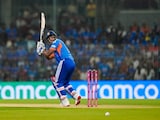- Several ministers and leaders were placed under house arrest to prevent Kashmir Martyrs Day observance
- The administration denied permission for events marking the 1931 July 13 killings anniversary
- July 13, 1931, marks the killing of 22 protesters by Maharaja Hari Singh's forces in Srinagar
Several ministers in the Omar Abdullah-led Jammu and Kashmir government, MLAs and top leaders of the ruling party and the Opposition were put under house arrest or detained to prevent them from observing Kashmir Martyrs' Day today.
The administration of Lieutenant Governor Manoj Sinha denied permission for any event to mark the anniversary of the 1931 July 13 killings in Kashmir during a protest against Hari Singh, ruler of the then princely state of Jammu and Kashmir under British paramountcy. The Union Territory administration imposed restrictions in several parts of Srinagar and warned of strict action against anyone who tried to proceed towards the Martyrs' Graveyard.
Chief Minister Omar Abdullah strongly condemned the restrictions and house arrests. "13th July massacre is our Jallianwala Bagh. The people who laid down their lives did so against the British. Kashmir was being ruled under the British Paramountcy. What a shame that true heroes who fought against British rule in all its forms are today projected as villains only because they were Muslims. We may be denied the opportunity to visit their graves today, but we will not forget their sacrifices," Mr Abdullah said in a post on X.
Mehbooba Mufti, PDP leader and former Chief Minister, said the "dil ki doori" Prime Minister Narendra Modi spoke about will truly end the "day you accept our heroes as your own just as Kashmiris have embraced yours, from Mahatma Gandhi to Bhagat Singh".
"When you lay siege to the Martyrs' Graveyard, lock people in their homes to prevent them from visiting Mazar-e-Shuhada, it speaks volumes. July 13th commemorates our martyrs those who rose against tyranny, much like countless others across the country. They will always be our heroes," she said.
Sajad Lone, MLA and chief of Jammu and Kashmir People's Conference, said he had been put under house arrest. "I don't know why the union government is so keen to redefine what is sacred for the people of Kashmir. The sacrifices rendered on July 13 are sacred for all of us," he said on X, adding, "Histories that are etched in blood don't vanish".
Earlier, the National Conference wrote to the Lieutenant Governor, urging him to restore the public holiday on July 13 in memory of those killed in the 1931 protest. But this request was turned down, and the district magistrate denied permission to hold any event.
What Happened On July 13, 1931
July 13 is an epochal day in the history of Kashmir. On this day in 1931, a group of Kashmiris were protesting outside the Srinagar jail. They were supporters of Abdul Qadeer, who had called on Kashmiris to rise against Dogra ruler Hari Singh. He was charged with sedition. On July 13, a large group of protesters gathered outside the prison where Abdul Qadeer was being held. Faced with the protesters, the Maharaja's forces opened fire, killing 22 people. The July 13 killings triggered massive protests and forced the Dogra ruler and the British to look into the grievances of the Muslim community in the Valley. The first Assembly polls in Jammu and Kashmir were also a political fallout of the July 13 killings. These polls marked the beginning of the democratic process in Jammu and Kashmir after centuries of autocratic rule, even though the Maharaja had sweeping powers.
What Has Changed
Earlier, police personnel gave a gun salute and floral tributes were offered at the Martyrs' Graveyard on July 13 every year. Political leaders would pay tributes and hold public meetings in memory of those killed in 1931. But ever since the special status of Jammu and Kashmir was revoked in 2019 and the erstwhile state was bifurcated into two Union territories, the administration has prohibited any function at the Martyrs' graveyard. Since 2020, July 13 and December 5 -- former Jammu and Kashmir Prime Minister and Chief Minister Sheikh Abdullah's birth anniversary -- have been dropped as official holidays. Instead, the birth anniversary of Hari Singh is now a public holiday in Jammu and Kashmir.















